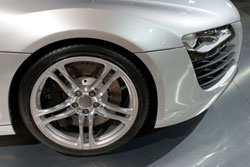Lightweight steel for lighter, faster, cars and planes
Eight organisations from four countries across the EU have partnered up for the SCHECAS project. It set as its overall aim to produce and test novel materials and manufacturing techniques. Project partners at QinetiQ in the United Kingdom tested MMC steel material, the end users of which are the European aerospace and the automotive industry. In order to test the material, three product forms of the MMC steel were manufactured and evaluated: a gear, a piston rod and a forged rib. Production scale batches of the material were successfully produced. It was found that the MMC steel material kept a simple shape and demonstrated near shape powder processing. The material also demonstrated a forge capability and workability at low temperatures. Some variants of the material exhibited mechanical properties, in particular that of ductility improved by forging. In addition to assessing these properties, the project defined suitable joining and machining techniques for these steel MMCs. The scientists also achieved the objective of generating data to increase the awareness of the performance of this material and several materials data sheets are planned for each family of steel MMC material. This project has enabled greater understanding of these materials and identified some potential applications where its unique properties can be exploited. It is expected that once this material is being used on a regular basis in the production of cars and planes, particular benefits will be incurred. The improved operating efficiency of aircraft and motor vehicles will lead to reduced fuel emissions, and the development of materials with inherent corrosion and wear resistance will lead to reduced dependence on plating processes. The programme therefore addresses the need to develop products and manufacturing routes that minimise their environmental impact, the issue of sustainable mobility.







